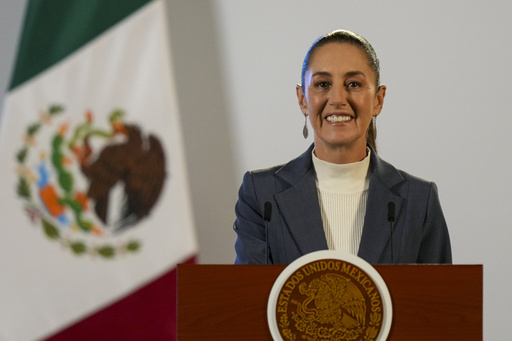MEXICO CITY — On Wednesday, the president of Mexico introduced a special bilingual “hymn” in honor of Mexican migrants residing in the United States. This unveiling coincides with ongoing issues faced by migrants from various countries, who continue to encounter abuse, delays, and hostility in Mexico.
President Claudia Sheinbaum presented the piece, titled “Migrant Hymn,” during her routine morning news conference. The song’s lyrics incorporate both English and Spanish, highlighting a sense of determination with phrases like “where we are from, no nos rajamos” (we don’t give up). Sheinbaum described Mexican migrants as “heroes,” noting that they contributed a significant $63 billion to their families back in Mexico last year.
Emphasizing the loyalty of these migrants to their homeland, the song includes the line “Cambiamos de lugar, no de bandera” (we change our location, not our flag). It is estimated that around 11 million Mexicans currently reside in the United States, with approximately 5 million living without proper documentation. Many of these individuals have fled Mexico due to violence or a lack of opportunities, raising questions about their attachment to the Mexican government.
The willingness and capability of the Mexican administration to confront challenges, particularly amid threats from incoming U.S. president Donald Trump regarding mass deportations, remain uncertain. Israel Concha, director of New Comienzos, an organization in Mexico City assisting returning migrants, expressed concern, stating, “The challenges don’t stop when we return to Mexico. Once again we face uncertainty about whether our own government is willing to accept us back in a dignified way and help us.”
On the same day as the hymn’s release, a migrant shelter in Reynosa—a border city in northern Mexico—announced it could no longer accept new arrivals. This decision was prompted by an increase in kidnappings of migrants happening right outside the shelter. Rev. Héctor Silva, who manages Senda de la Vida (Path of Life) in Reynosa, shared that local police now provide escorts for migrants attending U.S. asylum appointments due to the alarming dangers in the cartel-infested area.
“Until people have security and they stop kidnapping migrants when they arrive … we don’t want any more arriving,” Silva remarked.
In conjunction with these events, a new group of migrants commenced their journey northward toward the U.S. border from Tapachula, a city near Guatemala. These individuals expressed frustration over government blocks preventing their passage through Mexico. However, their prospects of traveling far seem bleak. In November, authorities dismantled two similar migrant caravans.
Despite the significant migrations of 2018 and 2019, which had provided some buses for assistance, no caravan has successfully reached the U.S. border solely by walking or hitchhiking in a structured manner, although some participants have managed to progress individually. Over the years, migrants in caravans have faced obstruction, harassment, and detainment by Mexican police and immigration officials, often being sent back to areas near the Guatemalan border.
This week, the humanitarian organization Doctors Without Borders released a report indicating that “hundreds of thousands of migrants, the majority crossing to reach the United States, fall into limbo in Mexico, hemmed in by violence.”



